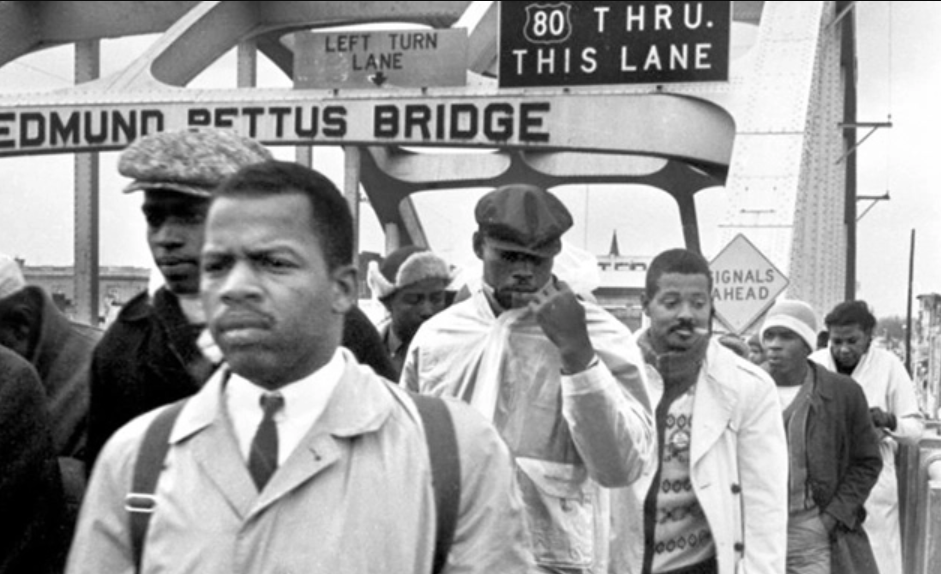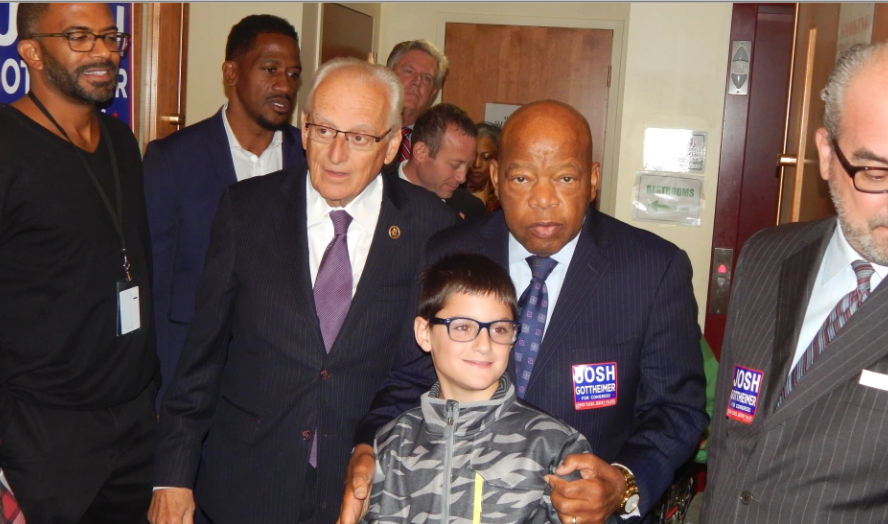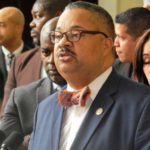I Knew George Washington

"Sit here, next to me," said the man in the most friendly and gracious, down-to-earth manner, and I did. This was in Georgia, too many years ago, and we talked, just before he spoke to the room in that urgent, impassioned way of his, about injustices that seem, in many respects, to have only worsened and intensified since that day.
I called him a few times, too, after that, and the subjects were the same: fair housing, healthcare, jobs with living wages, and I spoke to many people about him, including an old civil rights activist who wouldn't eat catfish because it was the last meal his friend, Martin Luther King, Jr., ate at the Lorraine Motel. Years later I saw him, and with him gone now it feels like I can say I knew George Washington. That's the feeling, having met and spent even just a little time with the late U.S. Rep. John R. Lewis (D-Ga.).
We don't come across too many people in this life whose passions transcend narrow parochialisms or the enduring paroxisms of special interest, or whosse words, rooted in real courage, bridge chasms, certainly not here in New Jersey, which downgrades gravitas to eccentricity and submits vision to political machinery. Maybe we encounter a few, or two or one. I remember when Mario Cuomo was still alive and he spoke to a New Jersey room that looked like Stag at Sharkey's, and by the end of his remarks, the caricature faces of gangsters appeared angelic.
But John Lewis was more than a leader. More than an elected official in the employ of a political boss. He was the leader of a movement, which goes back to the beginning of the country, back to the unsolved and unresolved agonies that plague us still, and persecute a race of people, a dislocation from what we say we are, which persecutes us all. When he threw on that backpack in segregated Alabama and peacefully led African American marchers across the Edmund Pettus Bridge in a demonstration for their right to vote as American citizens, he walked into a wall of all-white (some newly deputized) law enforcement officers with truncheons, and took a beating on the back of his head that nearly killed him.
This was a different war than the one Washington fought to establish the country, but the principle was the same. Battles unfought and unwon at the outset with muskets and guerilla tactics became the 1965 protest march of Selma's Bloody Sunday. That same year, directly forced by what happened on the bridge, Congress passed the Voting Rights Act, prohibiting racial discrimination in voting, one of the most significant pieces of legislation ever in this country, and critical to the creed of its founding.
"Do not get lost in a sea of despair," Congressman Lewis wrote in 2018. "Be hopeful, be optimistic. Our struggle is not the struggle of a day, a week, a month, or a year, it is the struggle of a lifetime. Never, ever be afraid to make some noise and get in good trouble, necessary trouble."
[caption id="attachment_97435" align="alignnone" width="888"] John Lewis with Bill Pascrell[/caption]
John Lewis with Bill Pascrell[/caption]
He came to New Jersey a few times, or made his presence known, notably in 2o12, when in absentia he endorsed his friend U.S. Rep. Bill Pascrell in a Democratic Primary, or in 2016, I believe, when he made an appearance in Hackensack on behalf of the candidacy of Josh Gottheimer. He also headlined at least one event for U.S. Rep. Donald Payne, Jr. (D-10). He was here many times, actually.
I wrote this at the time:
"It’s tough to shake off the equivalent of a section of Mount Rushmore getting dropped on your back with two weeks to go before Election Day, but that’s what Democrats are banking on to finish off incumbent Republican Congressman Scott Garrett of the 5th District.
"They flew in living Civil Rights legend John Lewis to deal the final ignominious blows to the flailing, rickety Garrett, who has his toughest foe ever – given the temper of the times and the congressman’s own missteps – in former Bill Clinton speechwriter... Gottheimer."
Today, Congressman Payne issued this fine statement:
“This is just a devastating loss for me and our entire country. Congressman Lewis was such a great
[caption id="attachment_3989" align="alignright" width="150"] Congressman Payne[/caption]
Congressman Payne[/caption]
fighter for the right thing in our nation. For me, I have lost one of my fathers on the floor of the House. I was in awe of how he could convey such power and strength with a gentle demeanor. His passion and love for his country and people brought out a ferociousness in this mild-mannered man. He didn’t just speak for civil rights, he stood up against abuse and suffered to make this a better country for all Americans.
"I learned so much from him. One of my greatest honors happened when we held a ‘sit-in’ on the floor of the House to try and get a vote on gun control legislation. It was his leadership that sparked that effort. There were so many situations like that I could mention. He always said it was important to ‘get into good trouble’ and those words have inspired me to this day. He was a hero, a mentor, a leader, and a great, great friend. As I said before, this is a tragic loss for our entire country.”
At times, it was mildly fun hanging around a legend like that in New Jersey, and kind of comically incongruous, like inviting Martin Luther King, Jr. to bumper boats on the boardwalk with the cast of Jersey Shore. Somehow it didn't fit, and yet it fit for him, probably because he was so easygoing and unostentatious. Maybe because our earlier George Washington spent so much time in New Jersey. I got the feeling that in this corruption-creaking bog, we craved an opportunity not merely to grapple in the same stagnant tank, but to have someone, someone of more than just real substance and stature - of actual iconic courage, come here to teach.
It's a memory of the country I have from Georgia, though, that doesn't go away, talking with he who walked with the wind, in his words, before I drove a rickety car across the state line to Montgomery and down to Edmund Pettus, to stumble retrace the steps of that majestic man I met, who we lost last night, but who, in all colossal humble grandeur persists, as long as a bridge to transcend the divide called America still exists.
[caption id="attachment_97436" align="alignnone" width="679"] John Lewis at the Edmund Pettus Bridge[/caption]
John Lewis at the Edmund Pettus Bridge[/caption]





